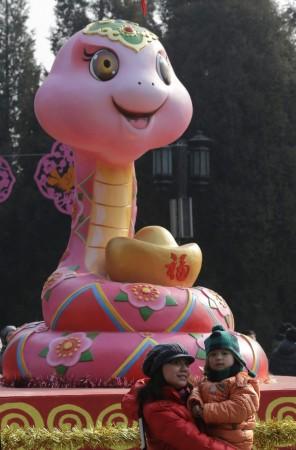
The Chinese calendar will soon move from the Year of the Snake to the Year of the Wooden Horse, with the Chinese New Year set to begin on 31 January of the Roman calendar.
Sheng Xiao, the Chinese calendar, is divided into 12 cycles, with each representing an animal. Each cycle lasts for one year, and 2014 is the Year of the Wooden Horse.
Chinese New Year is associated with several myths, regional customs and traditions. But apart from the traditional customs, the Chinese New Year also believes in superstitions and taboos.
Also Read: Chinese New Year 2013: Predictions for the Year of the Wooden Horse
Here are the top superstitions surrounding the Chinese New Year:
1. House Cleaning before New Year - Sweeping and cleaning should be done before the New Year's Day, as it is said that it removes bad luck from house. It is also believed that before the New Year' Eve the cleaning equipment like brooms, brushes, dusters, dust pans and others should be kept away.
2. Use of Firecrackers: Bursting firecrackers on New Year's Eve is one way the Chinese sends out the old year and welcomes the new one. Also, it is believed that there was a half-dragon, half-lion monster called as "Nian". The creature would come down from the mountains and scare humans every year. So when people understood that the beast abhorred uproarious commotions, they chose to beat it with the clamor from sparklers.
3. No Ghost Stories - Chinese believes that whatever happens on the first day of the year will happen for the rest of the year. Using foul language, unlucky words or adage anything awful about others are a taboo on the first day. Ghost stories generally mention about death, spirits and negative power, so children as well as elders are forbidden from telling ghost stories.
4. No Washing Hair - Washing hair on New Year's Day is considered bad luck, because people believe that washing hair sweeps away good luck for the New Year.
5. No black clothes: According to Chinese, black is related to death and bad luck, so they avoid wearing black clothes on the first day of the year.
6. Guarding Parents: On New Year's night children are expected to sleep late. It is believed that sleeping late is related to guarding parents' life. The later the children sleep, the more years their guardians will live.
7. No Crying - It is believed that if you cry on New Year's Day you will cry throughout the year. That is why children are not punished on the first day of the year.
8. Broken Crockery: One should not start the New Year with broken crockery as it is considered to be bad luck.
9. No Cutting: Chinese believe that nothing should be cut on the New Year as it will reflect on one's life and fortune.
10. Red is Good - Splendid red attire, beautifications and adornments are recommended prescribed for the Chinese New Year. Youngsters receive cash in red paper envelopes from parents who wish them a cheerful New Year. Red paper-cuts and couplets with mainstream subjects of favorable luck or bliss are utilized to brighten the family unit.
Also Read: Chinese New Year 2013: Predictions for the Year of the Wooden Horse














